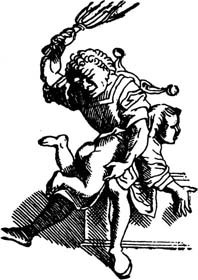@URDailyHistory — 13 June 1920: The U.S. Post Office rules that #children can not be sent via parcel post. Several children had been sent in that manner before the ruling. #unbelievable #wow #history #USPS #PostOffice #firstclass #OTD
Daily Archives: 13 Jun 2024
Quote of the Week
@tryBibLing tweeted
Never believe a ‘new method’ will make language learning ‘easier’ or ‘faster’. There are no shortcuts. Language learning is challenging work. Discipline — not talent — is your greatest asset.
That’s absolutely true.
A Tidbit from the Life of Erasmus
 In 1500 Erasmus wrote a friend these lines:
In 1500 Erasmus wrote a friend these lines:
My Greek studies are almost too much for my courage; while I have not the means of purchasing books, or the help of a teacher. And while I am in all this trouble, I have scarcely the wherewithal to sustain life; so much is our learning worth to us!
Erasmus valued learning and teaching above eating. Most of our contemporaries value eating more, so that while they are happy to spend $60 on a dinner out they cringe at the thought of spending that much on a great book.
We live in strange times.
I Stand By This Ancient Wisdom of Mine, Uttered 9 Long Years Ago
If pastors spent as much time in the biblical languages as they do in video games, they’d all be A.T. Robertson’s and H.H. Rowley’s.
Quote of the Day
Luther: On Adultery and Fornication
 “Then Ignatius inquired, “Dear Doctor, is fornication also a sin if I don’t take another man’s wife but an unattached wench, as long as I am myself free too?” The doctor [Martin Luther] replied by citing Paul, “Neither the immoral [… nor adulterers … will inherit the kingdom of God, I Cor. 6:9].” “Paul,” he added, “made no distinction between fornication and adultery. I can’t make a law for you. I simply point to the Scriptures. There it is written. Read it for yourself. I don’t know what more I can do.” — Martin Luther
“Then Ignatius inquired, “Dear Doctor, is fornication also a sin if I don’t take another man’s wife but an unattached wench, as long as I am myself free too?” The doctor [Martin Luther] replied by citing Paul, “Neither the immoral [… nor adulterers … will inherit the kingdom of God, I Cor. 6:9].” “Paul,” he added, “made no distinction between fornication and adultery. I can’t make a law for you. I simply point to the Scriptures. There it is written. Read it for yourself. I don’t know what more I can do.” — Martin Luther
The Anniversary of Luther’s Marriage
Schaff writes
On the evening of June 13, on Tuesday after Trinity Sunday, Luther invited Bugenhagen, Jonas, Lucas Cranach and wife, and a professor of jurisprudence, Apel (an ex-Dean of the Cathedral of Bamberg, who had himself married a nun), to his house, and in their presence was joined in matrimony to Catharina von Bora in the name of the Holy Trinity. Bugenhagen performed the ceremony in the customary manner. On the following morning he entertained his friends at breakfast. Justus Jonas reported the marriage to Spalatin through a special messenger. He was affected by it to tears, and saw in it the wonderful hand of God. On June 27 Luther celebrated his wedding in a more public, yet modest style, by a nuptial feast, and invited his father and mother and his distant friends to “seal and ratify” the union, and to “pronounce the benediction.” He mentioned with special satisfaction that he had now fulfilled an old duty to his father, who wished him to marry.*
______________
*History of the Christian Church, vol. 7 (New York: Charles Scribner’s Sons, 1910), 458–459.
The Followers of Folly Compared With the Followers of Wisdom
Folly speaking to Wisdom (in ‘In Praise of Folly)-
Look how your hard plodding students, by a close sedentary confinement to their books, grow mopish, pale, and meagre, as if by a continual wrack of brains, and torture of invention, their veins were pumped dry, and their whole body squeezed sapless; whereas my followers are smooth, plump, and bucksome, and altogether as lusty as so many bacon-hogs, or sucking calves; never in their career of pleasure to be arrested with old age, if they could but keep themselves untainted from the contagiousness of wisdom, with the leprosy whereof, if at any time they are infected, it is only for prevention, lest they should otherwise have been too happy.
Bacon-hogs and sucking calves, plump and bucksome, happily ignorant their whole lives as long as they don’t come in contact with wisdom which folly views as leprosy… Erasmus would be proud that his vision of the foolish has been literally fulfilled in the masses.
Zwingli Describes His Decision to Leave Glarus for Einsiedeln
Writing to Vadianus from Einsiedeln on June 13, 1517, thus explains his leaving Glarus:
“I have changed my residence, not at the stimulus of desire or of avarice, but because of the wiles of the French; and now I am at Einsiedeln.… What disaster that French faction has at last wrought me the wind of rumour has doubtless wafted to you. In the things done I too have had a part, but I have borne or have learned to bear many misfortunes.
Zwingli is referring to his anti-mercenary preaching and the opposition that preaching provoked in the town and among supporters of the French.





You must be logged in to post a comment.